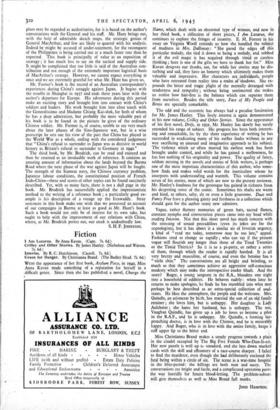Fiction
I Am Lazarus. By Anna Kavan. (Cape. 7s. 6d.)
Crilley and Other Stories. By James Hanley. (Nicholson and Watson.
7s. 6d.) Interim. By R. C. Hutchinson. (Cassell. 7s. 6d.) Green for Danger. By Christianna Brand. (The Bodley Head. 7e. 6d.) Wax the appearance of her first book, Asylum Piece, in 1940, Miss Anna Kavan made something of a reputation for herself in a difficult genre. Since then she has published a novel, Change the
Name, which dealt with an abnormal type of woman, and now in her third book, a .collection of short pieces, I Am Lazarus; she continues to explore the fringes of insanity E. M. Forster in his essay on Virginia Woolf reminds us how she handled the subject of madness in Mrs. Dalloway: " She pared the edges off this particular malady, she tied it down to being a malady, and robbed it of the evil magic it has acquired through timid or careless thinking ; here is one of the gifts we have to thank her for." Miss Kavan deserves our thanks, too, for while her stories may be dis- turbing and sad, they have an honesty which ultimately makes them valuable and impressive. Her characters are individuals, people who have retreated from reality into a realm of shadcoks. She ex-
pounds the bitter and tragic plight of the mentally deranged with tenderness and sympathy ; without being sentimental she makes us realise how hair-fine is the balance which can separate them from ourselves. Besides the tide story, Face of My People and Benjo are specially remarkable.
The odd and the eccentric has always had a peculiar fascination for Mr. James Hanley. This lively interest is again demonstrated in his new volume, Crilley and Other Stories. Since the appearance of his first novel, Drift, in rcop, Mr. Hanley has slowly but surely extended his range of subject. His progress has been both interest- ing and remarkable, for by the sheer experience of writing he has succeeded in eradicating many of his earlier faults without in any way sacrificing an unusual and imaginative approach to his subject. The violence whith so- often marred his earliest work has been brought under control, and while he has gained a mellowness, he has lost nothing of his originality and power. The quality of fancy, seldom missing in the novels and stories of Irish writers, is perhaps one of the most important characteristics of this author, who some- how finds and makes valid words for the inarticulate whom- he interprets with understanding and warmth. This volume contains seven of his stories, most of which are new to the present reviewer, Mr. Hanley's fondness for the grotesque has gained in richness from his deepening sense of the comic. Sometimes his shafts are warm and kind, at others, salty, sly or even a little gruesome. Duet and Fancy Free have a pleasing gaiety and freshness in a collection which should gain for the author many new admirers.
Vague, rather fluttery memories of green hats, sacred -flames., constant nymphs and conversation pieces came into my head while reading Interim. Not that this short novel has much concern with the stressing of sexual peccadilloes (even its jokes are for the coprologists), but -it has about 'it a similar air of feverish urgency, a khid of " read me today, tomorrow may be too late," appeal. Fashions tend to change so rapidly ' who can say if the• present vogue will flourish any longer than those of the Tired Twenties or the Timid Thirties? So it is to a pi-party, or rather a series of them, through which the reader is rapidly hustled. It is all very breezy and masculine, of course, and even the heroine has -a "virile chin," Thy conversations are all bright and bristling, so much so that they sometimes achieve an aggressive self-conscious modesty which may make the introspective reader blush. And the story? Roger, a young sergeant in the RA.,- blunders one night into a household of oddities. He behaves rudely: when later he returns to make apologies, he finds he has stumbled into what may perhaps be best described as an extra-special collection of soul- states. He likes the atmosphere, the people and the welcome. Mrs. Quindle, an aristocrat by biah, has married the son of an old family retainer ; she loves him, but is unhappy. Her daughter is Lady Aulcheter ; she hates her husband, but is unhappy. The son, Vaughan' Quindle, has given up a job he loves to become a pilot in the R.A.F., and he is unhappy. Mr. Quindle, a farming lay- preaching doctor, is in love with the Chinese, and he is miserably happy. And Roger, who is in love with the entire family, keeps a stiff upper lip to the bitter end.
Miss Christianna Brand makes a steady progress towards a place in the citadel occupied by The Big Five Female Who-Dun-It-ers. Her new puzzle is well up to standard, and she lays down marked cards with the skill and effrontery of a race-course sharper. I failed to find the murderer, even though she had deliberately enclosed the fatal being within a circle of six. The scene is a war-time hospital in- the blitz-period : the killings are both neat and nasty. The conversations are bright and facile, and a complicated operation paves the way' horridly for future blOod-letting. The problem-solvers will give themselves as well as Miss Brand full marks.
JOHN HAMPON:


























 Previous page
Previous page